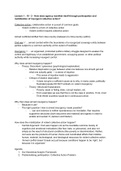Lecture 1 : 16 - 2 - How does agency manifest itself through participation and
mobilization of insurgent collective action?
Collective action: collaborative action in pursuit of common goals.
- Violent conflict is a form of collective action
- Violent conflict requires collective action
Armed conflicted shifted from inter-country (between) to intra-country (within)
Civil war = ‘... armed combat within the boundaries of a recognized sovereign entity between
parties subject to a common authority at the outset of hostilities.’
Insurgency = ‘... an organized, protracted politico-military struggle designed to weaken the
control and legitimacy of an established government, occupying power, or other political
authority while increasing insurgent control.’
Why does armed insurgency happen?
- Theory: Discontent / grievance (psychological explanation)
- Relative Deprivation (a gap between what one believes one should get and
what one actually gets) → a sense of injustice
- This sense of injustice leads to aggression
- Critique of relative deprivation
- It does not give a sufficient cause as to why, in many cases, politically
frustrated people DO NOT embark on violent insurgency;
- Theory: Structural Explanations
- Poverty, weak or failing state, corrupt leaders, etc.
- From examples we see that this is not the case in practice. If not, most
Third World countries would be in continuous turmoil.
Why then does armed insurgency happen?
- Because it can!
- The right question: How is armed insurgency made possible?
- ‘... war and violence is neither spontaneous nor inevitable. War requires
supportive structures (both discursive and material) and agents in order to
enable and sustain it’ (Jackson and Dexter)
How does the mobilization of violent collective action happen?
- Central Argument: Civil wars happen not as the inevitable outcome merely of
cognitive and emotional motivations (like fear, hate, or grievance), and also not
simply as the result of structural conditions (like poverty or discrimination). Rather,
civil wars are the products of human choice and coordinated efforts that mobilize
human, material, technological, and ideological resources for violent collective action.
- ‘Armed conflict doesn’t break out just because conditions happen to be ‘right’, but
because it is organized.’
Agenda
1. Our theoretical Analytic Framework
2. Problematising participation: Collective Action Problem
, 3. Selective Incentives
Our Theoretical Analytic Framework
Analysis: is the breaking down of a phenomenon into its constituent parts, and determining
the relationships between these parts in relation to the whole.
What is our Theoretical Analytic Framework?
→ Collective Action Theory
Analytical Components
- Opportunity Structures
- Mobilizing Processes
- Meaning-Generating Practices
Human action is enabled or constrained by social structures, cultural systems and material
resources. But these are also the result of human action.
Structures & Human Agency are Interdependent and co-constituted
“...it is important to explore how the relationship between material and discursive structures
and deliberate human action produces the social conditions in which organized political
violence becomes possible” (Jackson and Dexter).
→ Dynamic not static
,2. Problematising participation in violent collective action:
- What are you willing to die or kill for?
- Lethal conflict, like insurgent conflict, involves high stakes.
- Insurgent movements require participants : leaders and followers
How does agency manifest itself through participation in and mobilization of insurgent
collective action?
- Problematize ‘participation’
- Discontent does not automatically result in violent action
Collective Action Problems (/ The Rebel’s Dilemma):
- It will not happen if the cost of violent action outweigh the benefits of the violent
action
- Individuals are seen as rational actors.
- Free rider problem:
- You do not have to participate the receive the benefits
Why would a rational person deceive to take up arms (maybe paying with their lives) if they
would enjoy the benefits of a successful revolution anyway, even if they do not participate in
the fighting.
What are the solutions to the collective action problem?
1. Selective incentives
2. Pre-existing social networks and community institutions
3. Mobilizing an social movement organization
Selective incentives = ‘private benefits that can be withheld from those who do not
participate in the collective action’ (Mason).
- Selective incentives for participant-followers
- Leadership benefits
What are the limitations to conceptualizing ‘participation’ through the ‘rational actor
perspective’?
- Individuals are not thinking and acting as cost-benefit rational actors all the time.
- Most individuals are not isolated beings; rather, they are embedded within and
connected to broader social networks
- Emotions have effect on our choices
, Lecture 2 : 23 - 2 - How does agency manifest itself through participation in and
mobilization of insurgent collective action?
How does agency manifest itself through participation in and mobilization of insurgent
collective action?
→ The agency that is manifested when elites and audiences interactively participate in
meaning-making practices enables the discursive construction, justification, and
social-symbolic performance of political violence.
Today we will focus on meaning-generating practices
1. Collective action as ‘Social Performance’
2. (Discursive techniques of) Framing Processes & Politics of Naming
Meaning-generating practises are
- “...a set of society-wide military norms, values, identities, institutions and practices
which both enable and legitimize political violence… by giving meaning to materiality”
(Jackson & Dexter, p. 6)
- and to ways that members of a group perform their beliefs, values and allegiances to
an audience (Fuist, p. 428).
Meaning-generation practices are important because an “ideological foundation is a
necessary bedrock for the actions of conflict entrepreneurs seeking to enact political
violence, as without this base of accepted narratives, norms, beliefs and reinforcing




